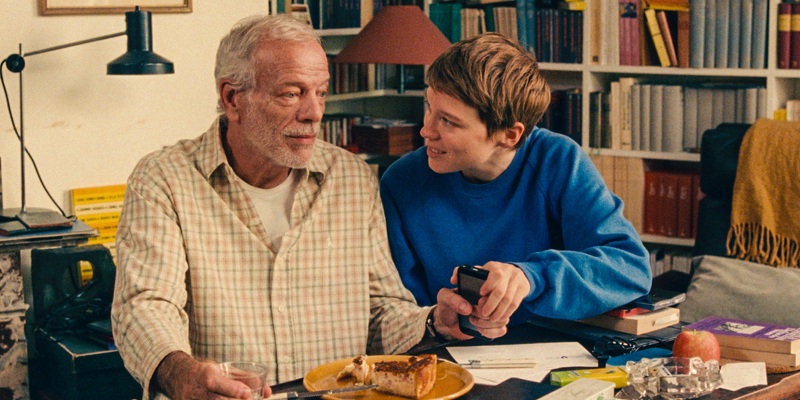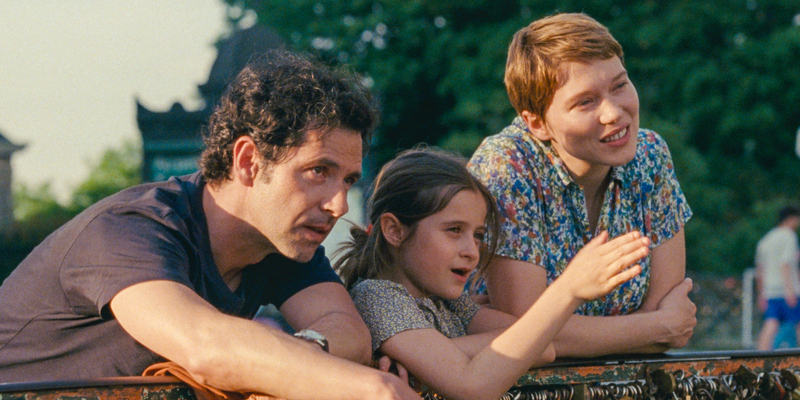
Review by
Eric Hillis
Directed by: Mia Hansen-Løve
Starring: Léa Seydoux, Melvil Poupaud, Pascal Greggory, Nicole Garcia, Camille Leban Martins

There's a brutally honest moment of human fragility near the end of
writer/director Mia Hansen-Løve's One Fine Morning. After saying goodbye to her senile and sightless father on a visit to
the depressingly utilitarian care home where he now resides, our
protagonist, Léa Seydoux's Sandra, is waiting for an elevator
when her old man, Pascal Greggory's Georg, wanders out of his
room and down the corridor towards her, calling out the name of his
lover, Leila (Fejria Deliba). Sandra could be a dutiful daughter
and walk her father back to his room, going through the process of
bidding him farewell all over again, but instead she pretends not to
notice him and enters the lift.

Out of context it could be viewed as a scene of immense cruelty, but
we've spent so much time with Sandra by that point that we fully
understand her actions. Sometimes saying goodbye is so painful that you
simply can't repeat it. This is especially so in the case of an elderly
parent whose time on this Earth is, you suspect, limited, as is the case
with Georg, once a lively professor, now a decaying shell housing a
rapidly disappearing soul.
With her latest drama, Hansen-Løve explores a truth that's rarely been
addressed in cinema before. It's the idea that we begin the grieving
process not after our loved ones pass away, but often well before their
light finally burns out. That's particularly the case if you have a
parent suffering from a chronic condition. The person who raised you
begins to disappear long before they actually pass away, and one of the
hardest things can be not knowing how long they have left, leaving a
question mark at the end of every goodbye.

Just to make matters worse for herself, Sandra, a widowed mother of a
young girl, Linn (Camille Leban Martins), is having an affair
with a married man, Clément (Melvil Poupaud). Like so many in
such a scenario, he claims that he'll leave his wife for Sandra but
never seems to be able to pull the trigger. This leaves Sandra wondering
if he'll ever return each time she bids him goodbye. It's a mirror of
the situation with her father. The two men Sandra loves could vanish
from her life at any moment.
Seydoux tangibly conveys the feelings of a woman who needs to be strong
for both her father and her daughter, who doesn't have the luxury of
being able to curl up in bed for a few hours and cry her eyes out. There
are moments when she breaks down in public, disrupting a conference
where she's working as a translator and fleeing from one of her father's
former students, whose praise for him is too much for Sandra to bear.
But mostly she's forced to hold herself together. There's a palpable
sadness in Seydoux's eyes throughout, even in Sandra's happier moments
(there's a truly joyous Christmas scene that will move even the most
rigid of atheists), because they're so loaded with uncertainty. Having
lost her husband, she's haunted by the thought of further
abandonment.

I have to confess I've struggled to relate to much of Hansen-Løve's
work, save for
Eden, because like the protagonist of that movie I was once a DJ who had to
eventually quit doing the thing that brought me the most joy. Much of
this is down to the very middle class milieu her characters reside in.
You're not going to see Hansen-Løve make a movie about a car plant
worker who comes home every evening, cracks open a beer, puts his feet
up in front of the telly and promptly falls asleep. Her protagonists are
usually glamorous women whose job is to translate some Austrian
philosopher's work into French, and they always seem to live in Parisian
apartments that should be well out of their pay-grade. But with
One Fine Morning she's made a movie on a universal theme.
Whether your job is to affix rivets to car doors or restore archaic
texts, whether you live in Neuilly-sur-Seine or the banlieues, love and
death will get you in the end, or perhaps as
One Fine Morning suggests, even sooner.


